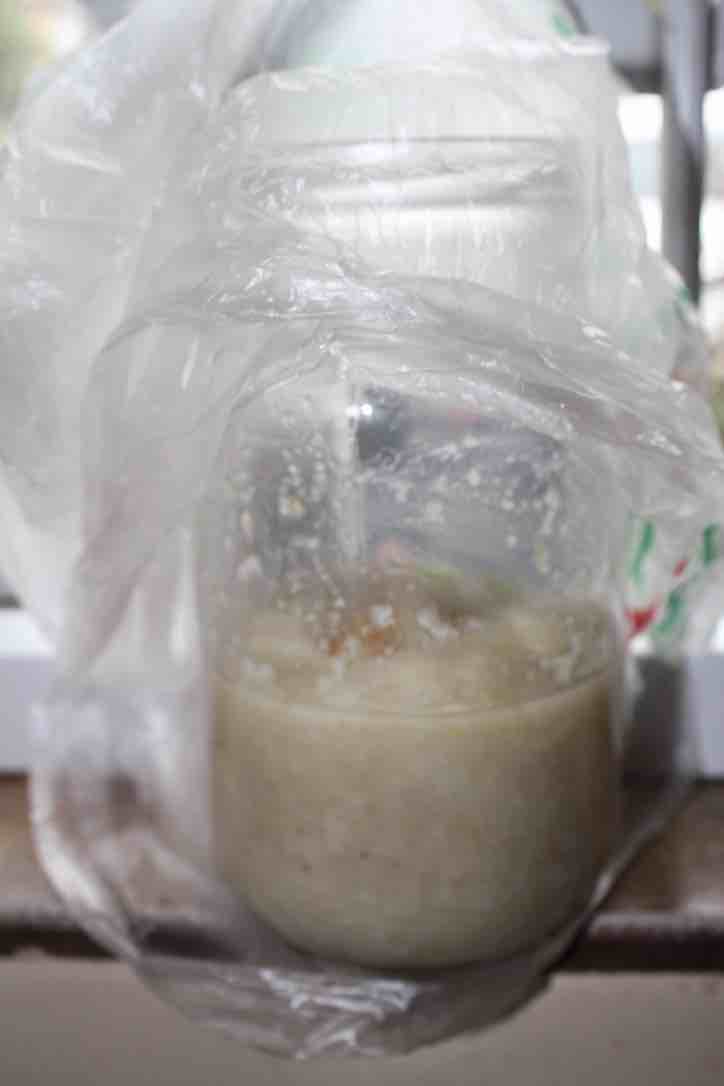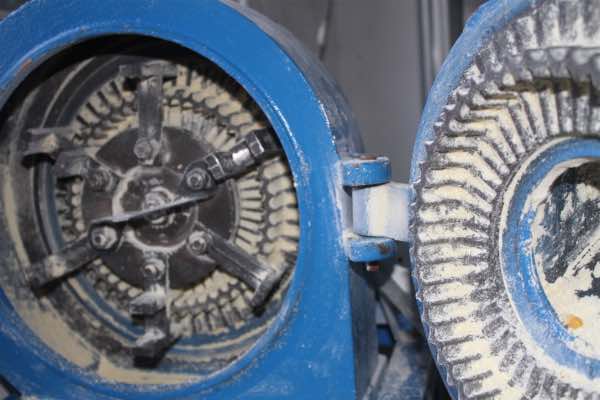Fermented maize porridge
Fermented maize porridge adds a new dimension of flavour and nutrients to your food, keeping always the microbiome in mind; those friendly bugs that inhabit our intestines.
Mind you they are often not so happy; dwindling in numbers, unfed with fibre and poisoned with food chemicals like artificial-sweeteners.
To counter this we can learn to make fermented foods like sauerkraut, kimchi or kefir; and fermented maize porridge. They have a not unpleasant sour taste and often better texture and even colour.

It is indeed incredible but a happy tum contains over 2kg of these microbes that are so beneficial to our well-being. Usually in modern society eating what is today being called the industrial diet these numbers are much depleted; and the spectrum diminished.
The Zulu people call this fermented drink amahewu; sometimes spelt mageu. There are three ways of going about this; all have their virtues.
- Take maizemeal porridge cooked in the usual way; add unchlorinated water, dried yeast and raw honey.
- Or ferment the maizemeal for a few days and then cook it; this kills off the bacteria but they leave their nutritious metabolites in the porridge.
- Alternatively make a porridge and add an inoculum of living bacteria; then allow the mixture to ferment for a few days. It is a true probiotic that will add to the teeming billions of the microflora in the gut.
Method 1: Porridge and dried yeast
- Take 2 TBSP thick maizemeal porridge and add 1 litre of warm unchlorinated water.
- Add 2 TBSP of raw honey.
- Use 1/4 tsp dried yeast granules.
- Place all ingredients into a large glass jar and leave to ferment in a warm place for a few hours. Stir occasionally.
- You could strain off the solids.
- Enjoy.
Method 2. Ferment and then cook
- 2 cups of wholegrain mealiemeal
- 3 cups of unchlorinated water
Go for it
- Mix the mealiemeal and water vigorously with a fork in a sealable glass container.
- Leave for five days to ferment in the dark, loosely covered with a plastic-bag; stir daily.
- Pour 2 litres of hot water into a heavy-based pot, add a teaspoon of salt and bring back to a vigorous boil.
- Turn the heat down to low, and pour in the ferment, stirring vigorously.
- Simmer on low-heat for at least 40 minutes; leave in an insulated box overnight adding the raw honey once it has cooled to blood temperature.
- Enjoy with butter, cream and milk.
Method 3. Porridge plus inoculum of bacteria
- 1 cup wholegrain-maizemeal
- 9 cups unchlorinated-water
Go for it
- Add 1 cup of maizemeal to one cup of cold-water; stir.
- In a large saucepan bring 8 cups of water to a vigorous boil.
- Turn down the heat; add the mixture of maizemeal and cold-water. Stir until it comes back to the boil.
- Simmer for 15 mins.
- Allow to cool to body temperature and add an inoculum; that could be a tablespoon of wholegrain wheat flour, sourdough starter or kefir.
- Allow to ferment in a warm, dark spot for one or more days.
- Stir daily.
- Your amahewu can be kept in the fridge for several days, enjoyed as a refreshing drink by young and old alike.
Your maize porridge is fermented in the main by lactic acid bacteria giving the drink a pleasantly sour-flavour; amahewu. There are alcoholic alternatives using a different inoculant containing mainly yeasts.
Broad spectrum of bugs
The research is pointing not only to the number of friendly bacteria, yeast-cells and viruses in the alimentary canal but also to the diversity; a broad spectrum of bugs is even better. Experimenting with different inoculums is important.
"More than a decade ago, little was known about the myriad of microorganisms that live happily inside and on our bodies. Now researchers believe they could change the future of human well-being."
- BBC[1]
If using honey then it is vitally important that it be completely-unheated or raw; processing kills off the bugs.
Fermented maize porridge
Fermented maize porridge is richer in food-value and tastes better.
From your food
In a world looking to make a fast-buck the pharmaceutical world is looking to make vast amounts of money by turning this ancient practice of fermenting our foods into big business. From your own kitchen the advantage is that you will get a broader spectrum of bugs.
But now and again taking a neutraceutical "drug" perhaps makes some sense; but our understanding is that we should be getting our probiotics first and foremost from our own fermented foods.
And it's only because we have got so far from making our own kefir and fermenting cabbage for example to make sauerkraut and kimchi that our intestines have got into such a mess in the first place.
This fermented maize porridge is just one more natural probiotic that you can add to your own armamentarium.
The material expressed on this page is gleaned from the nutritional and environmental literature; it is clearly referenced. A plain distinction is made between the author's opinion and that which is scientifically proven. When in doubt consult your health professional.
To suggest a correction or clarification, write to Dr Bernard Preston here. Contact.
Live bugs vs their metabolites
These friendly bugs in our alimentary canals produce a wide-range of metabolites that are extremely beneficial to our wellness. Short chain fatty compounds like butyric acid, for example are extremely important in normalising our immune systems.
Foods which are fermented first and then cooked, like sourdough bread, leave you only with the metabolites.
Maize porridge which is first cooked and then fermented has the advantage of providing both the metabolites and the bugs.
In fact we should be doing both; each way has its merits.
Wholegrain grits
Stone ground grits is almost impossible to find unless you have your own mill; it will be very expensive.
But there are alternatives; this industrial new-generation maize-mill produces fine meal that has not been separated into it's three parts. It contains all the germ and bran.
 No separation of the bran, germ and meal
No separation of the bran, germ and mealWholegrain grits has a very definite shelf life; the highly nutritious oils start to go rancid when the corn is milled. Keep it in an air-tight container in the freezer.
Shirley Button
The following comes from Shirley Button, an inspirational lady in every sense. She was a true Blue Zone lady, dying in her nineties with all her marbles intact, vigorous to the end.
A Christmas time a beast was slaughtered for the staff; with extra gallons of Zulu beer made in the compound. On a Sunday there was a party for the farm children; and inevitably their cousins and relations from adjoining locations.
There were buns, sweets to eat and gallons of Oros to drink; and balloons and balls to play with. Each child got a present and every family a parcel of groceries.
The children loved the games and the sack races; the egg and spoon too.
Maduda Sithole, our remarkable induna started each race with his "Yirree" and he always organised the Tug o' War.
Whilst the kids played and raced themselves to exhaustion, the mothers and aunts with babies on their backs chatted on the sidelines, sipping their fermented maize porridge; toddlers watched wide-eye from mama's skirts. It was a special occasion for everyone; always rounded off with prayers and singing.
When browsing use right click and "Open Link in New Tab" or you may get a bad gateway signal.
Newsletter
Our newsletter is entitled "create a cyan zone" at your home, preserving both yourself and Mother Earth for future generations; and the family too, of course. We promise not to spam you with daily emails promoting various products. You may get an occasional nudge to buy one of my books.
Here are the back issues.
- Lifestyle and ideal body weight
- What are ultra-processed foods?
- Investing in long-term health
- Diseases from plastic exposure
- Intensive lifestyle management for obesity has limited value
- A world largely devoid of Parkinson's Disease
- The impact of friendly bacteria in the tum on the prevention of cancer
- There's a hole in the bucket
- Everyone is talking about weight loss drugs
- Pull the sweet tooth
- If you suffer from heartburn plant a susu
- Refined maize meal and stunting
- Should agriculture and industry get priority for water and electricity?
- Nature is calling
- Mill your own flour
- Bake your own sourdough bread
- Microplastics from our water
- Alternative types of water storage
- Wear your clothes out
- Comfort foods
- Create a bee-friendly environment
- Go to bed slightly hungry
- Keep bees
- Blue zone folk are religious
- Reduce plastic waste
- Family is important
- What can go in compost?
- Grow broad beans for longevity
- Harvest and store sunshine
- Blue zone exercise
- Harvest and store your rainwater
- Create a cyan zone at your home
Did you find this page interesting? How about forwarding it to a friendly book or food junkie? Better still, a social media tick would help.
Address:
56 Groenekloof Rd,
Hilton, KZN
South Africa
Website:
https://www.bernard-preston.com